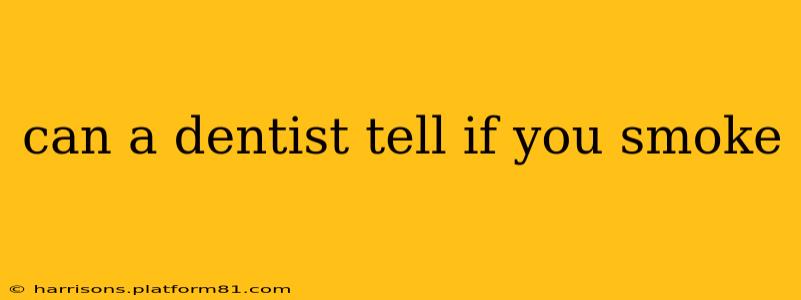Can a Dentist Tell if You Smoke?
Yes, a dentist can often tell if you smoke, and sometimes with surprising accuracy. While they might not directly ask you about your smoking habits, several telltale signs during a routine examination can reveal a smoker's lifestyle. This article will explore the various ways dentists detect smoking and answer some common questions surrounding this topic.
What Signs Does a Dentist Look For?
Dentists are trained to observe subtle changes in the oral cavity that are strongly associated with smoking. These signs can include:
-
Stained Teeth: This is perhaps the most obvious indicator. Nicotine and tar in cigarettes stain teeth a yellowish-brown, sometimes even a dark brown or grey hue. The staining is typically more pronounced on the surfaces of the teeth most exposed to smoke. While other factors can cause staining, the pattern and intensity of staining in smokers are often quite distinct.
-
Bad Breath (Halitosis): Smokers often experience persistent bad breath due to the lingering smell of smoke and the impact of smoking on oral hygiene. The smell can be quite characteristic and difficult to mask.
-
Gum Disease (Periodontal Disease): Smoking significantly increases the risk of gum disease. Dentists look for signs of inflammation, bleeding gums, gum recession, and bone loss around the teeth. These are often more severe and progress more rapidly in smokers compared to non-smokers.
-
Delayed Healing: Smoking impairs the body's ability to heal, impacting the recovery time for any oral procedures, including extractions, implants, or gum surgery. Dentists are aware of this and might notice slower healing in smokers.
-
Oral Cancer: Smoking is a major risk factor for oral cancer. Dentists routinely check the mouth, tongue, lips, and throat for any suspicious lesions or abnormalities during routine check-ups, paying particular attention to the risk factors present in their patients.
-
Dry Mouth (Xerostomia): Smoking can decrease saliva production, leading to dry mouth. Reduced saliva compromises the mouth's natural cleaning mechanism, contributing to tooth decay and gum disease.
How Accurate is a Dentist's Assessment?
The accuracy of a dentist's assessment varies depending on several factors. The intensity and duration of smoking, individual oral hygiene practices, and the presence of other health conditions all play a role. While a dentist can't definitively diagnose smoking based on a single observation, the combination of multiple signs significantly increases the likelihood of accurate identification.
Can a Dentist Tell How Much You Smoke?
While a dentist can't precisely quantify the number of cigarettes smoked daily, the severity of the oral signs—the extent of staining, the severity of gum disease, etc.—can offer an indication of the intensity and duration of smoking. Heavier and longer-term smokers usually exhibit more pronounced signs.
Why Would a Dentist Need to Know if You Smoke?
Understanding a patient's smoking status is crucial for several reasons:
-
Treatment Planning: Knowledge of smoking habits directly influences treatment planning and prognosis. For example, smokers might require more extensive periodontal treatment, or their healing time after surgery may be longer.
-
Risk Assessment: Smoking significantly increases the risk of various oral health problems. Knowing a patient smokes helps dentists provide appropriate preventative care and guidance.
-
Patient Education: Dentists can use this opportunity to educate smokers about the detrimental effects of smoking on oral health and offer support for quitting.
In conclusion, while a dentist might not directly ask if you smoke, they can often infer it from various observable signs during a routine examination. This information is valuable for providing effective treatment, assessing risk, and offering tailored advice to improve oral health. It’s essential to remember that maintaining good oral hygiene is crucial, regardless of smoking status.
